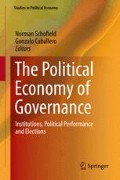Abstract
The literature on public choice has largely argued that when several actors are part of a decision-making process, the results will be biased towards overspending. However, the empirical studies of the effect of minorities and coalition governments on spending have yielded mixed support for this theoretical claim. This chapter argues that the inconclusiveness of the empirical evidence is related to problems of standard regression models to accurately capture unobserved heterogeneity. We use data from Spanish municipalities for the period 2004–2011 to compare the results of four typically used estimation methods: mean comparison, OLS, fixed-effects regression and matching. We argue that out of these models, matching deals better with unobserved heterogeneity and selection bias of the type of government, allowing us to reduce estimating error. The results show that, when we account for these problems in a matching model, minorities run lower surpluses than single party majorities. This result did not arise in simple mean comparisons or OLS models, or even in the fixed-effects specification. These results give support to the law of 1/n (Weingast, Journal of Political Economy 96: 132–163, 1981) and also underscore that in order to identify correctly the impact of government characteristics on policy-making, we need to understand that these are not randomly assigned across our units of observation. This advises the use of more quasi-experimental methods in our empirical research.
Access this chapter
Tax calculation will be finalised at checkout
Purchases are for personal use only
Notes
- 1.
Unless there were few municipalities and many years, in which the variation would be mostly over time. However, this is less likely to occur in voting data.
References
Alesina, A., & Roubini, N. (1992). Political cycles in OECD economies. The Review of Economic Studies, 59(4), 663–688.
Alt, J. E., & Lowry, R. C. (1994). Divided government, fiscal institutions, and budget deficits: Evidence from the states. American Political Science Review, 88(4), 811–828.
Artés, J., & Jurado, I. (2014). Do majority governments lead to lower fiscal deficits? A regression discontinuity approach. Manuscript.
Ashworth, J., & Heyndels, B. (2005). Government fragmentation and budgetary policy in “good” and “bad” times in Flemish municipalities. Economics and Politics, 17, 245–263.
Balassone, F., & Giordano, R. (2001). Budget deficits and coalition governments. Public Choice, 106(3–4), 327–349.
Baskaran, T. (2013). Coalition governments, cabinet size, and the common pool problem: Evidence from the German states. European Journal of Political Economy 32, 356–376.
Bawn, K., & Rosenbluth, F. (2006). Short versus long coalitions: Electoral accountability and the size of the public sector. American Journal of Political Science, 50(2), 251–265.
Borrelli, S. A., & Royed, T. J. (1995). Government ‘strength’ and budget deficits in advanced democracies. European Journal of Political Research, 28(2), 225–260.
Carlsen, F. (1997). Counterfiscal policies and partisan politics: Evidence from industrialized countries. Applied Economics, 29(2), 145–151.
de Haan, J., & Sturm, J.-E. (1994). Political and institutional determinants of fiscal policy in the European community. Public Choice, 80, 157–172.
de Haan, J., & Sturm, J.-E. (1997). Political and economic determinants of OECD budget deficits and governments expenditures: A reinvestigation. European Journal of Political Economy, 13, 739–750.
de Haan, J., Sturm, J. E., & Beekhuis, G. (1999). The weak government thesis: Some new evidence. Public Choice, 101(3–4), 163–176.
Falcó-Gimeno, A., & Jurado, I. (2011). Minority governments and budget deficits: The role of the opposition. European Journal of Political Economy, 27, 554–565.
Franzese, R. J. (2000). Electoral and partisan manipulation of public debt in developed democracies, 1956–90. In R. A. Strauch & J. Von Hagen (Eds.), Institutions, politics and fiscal policy (pp. 61–83). Boston: Kluwer Academic Press.
Grilli, V., Masciandaro, D., & Tabellini, G. (1991). Political and monetary institutions and public financial policies in the industrial countries. Economic Policy, 13, 342–392.
Ho, D., Imai, K., King, G., & Stuart, E. A. (2007). Matching as nonparametric preprocessing for reducing model dependence in parametric causal inference. Political Analysis, 15, 199–236.
Le Maux, B., Rocaboy, Y., & Goodspeed, T. (2011). Political fragmentation, party ideology and public expenditures. Public Choice, 147, 43–67.
Roubini, N., & Sachs, J. (1989a). Government spending and budget deficits in the industrial countries. Economic Policy, 8.
Roubini, N., & Sachs, J. (1989b). Political economic determinants of budget deficits in the industrial economies. NBER Working Paper 2682.
Scartascini, C., & Crain, M. (2001). The size and composition of government spending in multi-party systems. Public Choice Society Meetings, Mimeo.
Shepsle, K. A., & Weingast, B. R. (1981). Structure-induced equilibrium and legislative choice. Public Choice, 37(3), 503–519.
Smith, H. L. (1997). Matching with multiple controls to estimate treatment effects in observational studies. Sociological Methodology, 27(1), 325–353.
Stuart, E. A. (2010). Matching methods for causal inference: A review and a look forward. Statistical Science, 25, 1–21.
Stuart, E. A., & Rubin, D. B. (2007). Best practices in quasi-experimental designs: Matching methods for causal inference. In J. Osborne (Ed.), Best practices in quantitative social science (pp. 155–176). Thousand Oaks, CA: Sage Publications. Chapter 11.
Volkerink, B., & de Haan, J. (2001). Fragmented government effects on fiscal policy: New~evidence. Public Choice, 109(2001), 221–242.
Weingast, B. R., Shepsle, K., & John, C. (1981). The political economy of benefits and costs: A neoclassical approach to distributive politics. Journal of Political Economy, 96, 132–163.
Woo, J. (2003). Economic, political, and institutional determinants of public deficits. Journal of Public Economics, 87(3), 387–426.
Author information
Authors and Affiliations
Corresponding author
Editor information
Editors and Affiliations
Rights and permissions
Copyright information
© 2015 Springer International Publishing Switzerland
About this chapter
Cite this chapter
Artés, J., Jurado, I. (2015). Fiscal Deficits and Type of Government: A Study of Spanish Local Elections. In: Schofield, N., Caballero, G. (eds) The Political Economy of Governance. Studies in Political Economy. Springer, Cham. https://doi.org/10.1007/978-3-319-15551-7_19
Download citation
DOI: https://doi.org/10.1007/978-3-319-15551-7_19
Publisher Name: Springer, Cham
Print ISBN: 978-3-319-15550-0
Online ISBN: 978-3-319-15551-7
eBook Packages: Business and EconomicsEconomics and Finance (R0)

